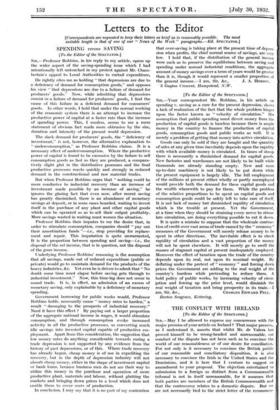Letters to the Editor
[Correspondents are requested to keep their letters as brief as is reasonably possible. The most suitable length is that of one of our " News of the Week " paragraphs.—Ed. SPECTATOR.] SPENDING versus SAVING [To the Editor of the SPECTATOR.] SIR,—Professor Robbins, in his reply to my article, opens up the wider aspect of the saving-spending issue which I had intentionally left untouched in my protest against Mr. Cham- berlain's appeal to Local Authorities to curtail expenditure. He rightly cites me as holding " that depressions are due to a deficiency of demand for consumption goods," and opposes his view that depressions are due to a failure of demand for producers' goods." Now, while admitting that depressions consist in a failure of demand for producers' goods, I find the cause of this failure in a deficient demand for consumers' goods. In other words, I hold that under the normal working of the economic system there is an attempt to increase the productive power of capital at a faster rate than the increase of spending power. This, I confess, seems to me a mere statement of obvious fact made more obtrusive by the size, duration and intensity of the present world depression.
The slack demand for producers' goods, the " deficiency of investment," is not, however, the alternative explanation to " underconsumption," as Professor Robbins claims. It is a necessary effect of underconsumption. Where the productive power of capital is found to be excessive by the failure to sell consumption goods as fast as they are produced, a compara- tively slight glut in the distributive processes and the final productive processes reacts quickly and strongly in reduced demand in the constructional and raw material trades.
But when Professor Robbins urges that "nothing could be more conducive to industrial recovery than an increase of investment made possible by an increase of saving," he ignores the glaring fact that even now, after recent saving has greatly diminished, there is an abundance of monetary savings at deposit, or in some cases hoarded, waiting to invest itself in the purchase of any plant and other capital goods which can be operated so as to sell their output profitably. More savings wasted in waiting must worsen the situation.
Professor Robbins then imputes to me the desire that, in order to stimulate consumption, companies should " pay out their amortization funds "—i.e., stop providing for replace- ment and repair. This imputation is quite unwarranted. It is the proportion between spending and saving—i.e., the disposal of the net income, that is in question, not the disposal of the gross income.
Underlying Professor Robbins' reasoning is the assumption that all savings, made out of reduced expenditure (public or private) would go to maintain demand for the products of the heavy industries, &c. Yet even he is driven to admit that " No doubt some time must elapse before saving gets through to industrial investment." Now, this time-lag does not occur in sound trade. It is, in effect, an admission of an excess of monetary saving, only explainable by a deficiency of monetary spending.
Government borrowing for public works would, Professor Robbins holds, necessarily cause " money rates to harden," a result " damaging to the prospects of industrial recovery."
Need it have this effect ? By paying out a larger proportion of the aggregate national income in wages, it would stimulate consumption, and through consumption evoke increased activity in all the productive processes, so converting much idle savings into invested capital capable of productive em- ployment. Apart from this consideration, the suggestion that low money rates do anything considerable towards curing a trade depression is not supported by any evidence from the history of past depressions, or of this. Where trade recovery has already begun, cheap money is of use in expediting the recovery, but in the depth of depression industry will not absorb cheap money, either in the shape of investment capital or bank loans, because business men do not see their way to utilize this money in the purchase and operation of more productive plant, materials and labour, without glutting the markets and bringing down prices to a level which does not enable them to cover costs of production.
In conclusion, I may say that it is no part of my contention that over-saving is taking place at the present time of depres- sion when profits, the chief normal source of savings, are very low. I hold that, if the distribution of the general income were such as to preserve the equilibrium between saving and spending under normal industrial conditions, the aggregate amount of money savings over a term of years would be greater than it is, though it would represent a smaller proportion of the general income.—I am, Sir, &c., J. A. HOBSON. ''3 Gayton Crescent, Hampstead, N.W.






























 Previous page
Previous page